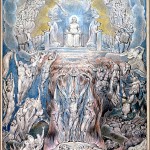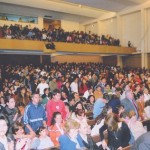A recent article on Religion Dispatches takes on the question few people bother to ask after failed apocalyptic prophecies: what happens to those who have invested their whole lives in the belief in an immanent Second Coming? With admirable sensitivity and sobriety, Tom Bartlett describes the aftereffects of Harold Camping’s end-of-the-world prediction for May 21, then October 21, 2011. Here is an excerpt:
May 21 believers couldn’t afford to doubt either. Whenever I met one, I would ask: Is there any chance you might be wrong? Could someone have miscalculated, misunderstood a verse, botched a symbol? Just maybe?
I asked this question of a believer in his mid-twenties. He started listening to Harold Camping’s radio show in college and immediately went out, bought a Bible, and immersed himself in it. After graduation, he took a job as an engineer at a Fortune 500 company, a job he loved and a job he quit because he thought the world was ending. He wrote the following in his resignation letter: “With less than three months to the day of Christ’s return, I desire to spend more time studying the Bible and sounding the trumpet warning of this imminent judgment.”
He would not entertain the possibility, even hypothetically, that the date could be off. “This isn’t a prediction because a prediction has a potential for failure,” he told me.
“Even if it’s 99.9 percent, that extra .1 percent makes it not certain. It’s like the weather. If it’s 60 percent, it may or may not rain. But in this case we’re saying 100 percent it will come. God with a consuming fire is coming to bring judgment and destroy the world.”
…
When a prophecy fails, it’s crucial that a group’s leaders provide an alternate explanation of what happened, or what didn’t happen, according to Lorne Dawson, a professor of sociology at the University of Waterloo, who has studied apocalyptic sects. “The followers of the group are so heavily invested that they have tremendous incentive to accept these rationalizations,” he said. But the revised story needs to be issued rapidly—wait too long and your followers will fall away.
The conversation shifted from why there was no earthquake on May 21 to whether the “door to salvation” was now closed. Rather than believers getting called up, as they expected, perhaps non-believers had been shut out, forced to continue on minus any hope of eternal life. The proofs for this were elaborate and hard to follow, much like the proofs for May 21, and constructing them provided a much-needed outlet for the intellectual energy of the more studious believers.
Now that there was no possibility of salvation, there was no obligation to spread the message. Indeed, there was nothing to do except wait patiently for October 21 when the earth would be divinely incinerated.
…
I was struck by how some believers edited the past in order to avoid acknowledging that they had been mistaken. The engineer in his mid-twenties, the one who told me this was a prophecy rather than a prediction, maintained that he had never claimed to be certain about May 21. When I read him the transcript of our previous interview, he seemed genuinely surprised that those words had come out of his mouth. It was as if we were discussing a dream he couldn’t quite remember.
Read the full article here.
The same belief adjustments have taken place in the decades following William Branham’s death. First 1977, then 1999, then 2001, now 2012: all of these have been, to Message believers, plausible dates for the return of Christ. Many who originally suspected that Branham would rise again on Easter morning, 1966, readjusted their views in a more spiritualist direction. Branham would return with the rest of the saints in the days prior to the Rapture. Until then, the Message itself would provide the “wedding garment” that the Bride needed to prepare herself for the Bridegroom. Many Message believers (my old church included) have become more savvy about the end of the world. “No one knows the day or hour” is practically an established creed. Although no one dares make an open prediction anymore, believers like my pastor would still assert that the Holy Spirit would let true believers know that the Rapture was coming in advance, reasoning that Jesus “whispers secrets” in the ear of his Bride. In other words, if you feel convinced that the end is coming on a certain day, you should keep quiet and pray, because the Bride may know but the World will never be allowed to guess the day that Jesus returns.















